Christina Harward
Ukrainian Tavriisk Group of Forces Commander Brigadier General Oleksandr Tarnavskyi stated in an interview with CNN published on September 23 that Ukrainian forces achieved a “breakthrough” on the left flank near Verbove and that Ukrainian forces continue advancing.[2] Combat footage posted on September 22 shows a destroyed Ukrainian Mine-Resistant Ambush Protected (MRAP) and BMP-2 operating slightly beyond Russia’s fighting positions trench line near Verbove, indicating continued Ukrainian progress in deploying more heavy equipment beyond Russia’s triune belt of the anti-vehicle ditch, dragon’s teeth, and fighting positions.[3] Commercially available satellite imagery indicates that Ukrainian forces have brought heavy equipment closer to Verbove over the past 96 hours in a manner consistent with Tarnavskyi’s statement.[4] The Wall Street Journal reported on September 21 that Ukrainian forces achieved a “limited breakthrough” west of Verbove citing an unnamed Ukrainian Air Assault Forces officer.[5]
Ukrainian forces have not overcome all of the prepared Russian defensive positions near Verbove. Ukrainian forces’ rate of advance near their breakthrough remains unclear. Russian forces likely still control segments of the long trench line of Russian fighting positions between Robotyne (10km south of Orikhiv) and Verbove, especially near the tactical high ground to the south. Russian forces have reportedly established prepared fighting positions in almost every tree line that Ukrainian infantry are slowly and systematically fighting through. Russian forces have more field fortifications beyond Verbove; there are more anti-vehicle trenches and fighting positions north of Ocheretuvate (26km southeast of Orikhiv), for example. It is unclear the extent to which those positions are manned, however. ISW continues to assess that the Russian military does not have sufficient forces deployed to this sector of the front to completely man its defenses in depth and that Ukrainian forces should be able to operate through Russian field fortifications more rapidly if they are not properly manned.[6]
Ukrainian forces are deepening their penetration in Zaporizhia Oblast and are assaulting Novoprokopivka – a frontline village 1.5 km immediately south of Robotyne. Geolocated combat footage posted on September 23 shows elements of the Russian 70th Regiment (42nd Motorized Rifle Division, 58th Combined Arms Army, Southern Military District) ambushing and killing two Ukrainian infantrymen in Novoprokopivka’s northeastern outskirts, indicating that Ukrainian forces have likely cleared Russian positions between Robotyne and Novoprokopivka.[7] Multiple Russian sources reported that Russian forces repelled a Ukrainian attack against northern Novoprokopivka on September 22.[8] This is the first confirmed Ukrainian ground attack in the immediate vicinity of Novoprokopivka.
Ukrainian military officials stated that the Ukrainian counteroffensive would continue in the winter. Tarnavskyi told CNN that he expected a major Ukrainian breakthrough after Ukrainian forces reach Tokmak (a major Russian stronghold in western Zaporizhia) and that it is important that Ukrainian forces not lose the initiative they currently hold.[9] Tarnavskyi also stated that Ukrainian operations will continue through the winter as Ukrainian forces are mostly advancing on foot without vehicles and that inclement weather will thus not have a major negative effect on the Ukrainian counteroffensive.[10] Ukrainian Main Military Intelligence Directorate (GUR) Head Lieutenant General Kyrylo Budanov echoed a similar assessment about continued Ukrainian winter operations in an interview with The War Zone published on September 22.[11] ISW has previously assessed that, while seasonal weather can slow ground movements and challenge logistics, it will not impose a definite end to Ukrainian counteroffensive operations.[12] The culmination of the Ukrainian counteroffensive will likely depend rather on the Russian and Ukrainian balance of forces as well as on Western aid to Ukraine.
The Ukrainian counteroffensive in western Zaporizhia Oblast has likely destroyed the Russian 810th Naval Infantry Brigade (Black Sea Fleet). Budanov stated in his interview with The War Zone published on September 22 that the 810th Brigade was “completely defeated” in southern Ukraine.[13] Budanov stated that the 810th Brigade has withdrawn and that Russian airborne (VDV) units replaced them on the front. Budanov‘s description of the status of the 810th Brigade corresponds most closely to the US military‘s doctrinal definition of the tactical mission task of “destroy”: “physically render[ing] an enemy force combat-ineffective until reconstituted.”[14] Elements of the 810th Brigade have reportedly been operating in the Zaporizhia direction since March 2023 and in western Zaporizhia Oblast since June 2023.[15] ISW previously observed the 810th Brigade in October 2022, when it was reportedly operating in Kherson Oblast, and the unit was likely reconstituting in the rear in the interim before assuming positions in Zaporizhia Oblast.[16] The 810th Brigade has repeatedly suffered significant losses, and Ukrainian forces have destroyed the unit in the past, following which the Russian military has reconstituted it. The Ukrainian General Staff reported on April 19, 2022, that the 158 soldiers of the 810th Brigade had been killed and about 500 wounded.[17] GUR Deputy Chief Major General Vadym Skibitskyi stated on July 31, 2022, that 200 servicemen of the 810th Brigade refused to return to the war in Ukraine, and the Ukrainian General Staff reported on September 12, 2022, that the 810th Brigade lost more than 85% of its personnel in the Kherson direction and that many again refused to return to combat.[18]
A senior Ukrainian official explicitly confirmed that Ukraine’s objective in Bakhmut is to fix Russian forces. Ukraine’s fixing of Russian forces in Bakhmut may be alleviating pressure on the Kupyansk frontline. Ukrainian Main Military Intelligence Directorate (GUR) Head Lieutenant General Kyrylo Budanov stated that Ukrainian forces achieved their objective of pinning Russian forces in Bakhmut and preventing their transfer to other areas of the theater – such as southern Ukraine – in a September 22 interview.[19] Budanov also stated that the Russian military deployed the recently created and not fully formed 25th Combined Arms Army (CAA) of the Eastern Military District “roughly north of Bakhmut.”[20] Budanov previously reported on August 31 that the Russian military deployed elements of the 25th CAA to replace elements of the 41st CAA (Central Military District) in the Kupyansk direction as elements of the 41st CAA began a "slow” redeployment to southern Ukraine.[21] The Russian deployment of elements of the 25th CAA to Bakhmut instead of Kupyansk will likely disrupt Russian efforts to fix Ukrainian forces in the Kupyansk direction, as Russian forces need these troops to continue assaults in place of the 41st CAA. Ukrainian officials and Russian sources have indicated that the tempo and the intensity of Russian offensives on the Kupyansk-Svatove-Kreminna line has significantly decreased in recent weeks as Russian forces are continuing to regroup and rotate personnel in this direction, and the redirection of the deployment of 25th CAA may have alleviated some of the pressure from this frontline.[22] Budanov’s statement supports ISW’s recent assessment that Ukrainian counteroffensive operations on Bakhmut’s southern flank have fixed a large amount of Russian combat power in Bakhmut that would otherwise be available to reinforce Russian defenses in the south — or, in this case, to attempt to force Ukrainian forces to redeploy to defend against Russian assaults around Kupyansk.[23]
Ukraine’s simultaneous counteroffensives in Bakhmut and southern Ukraine are impeding Russia’s long-term force generation efforts as Russia redeploys its new reserves to defend against Ukrainian advances. Russian Defense Minister Sergei Shoigu announced that the Russian Ministry of Defense (MoD) formed a “reserve army” at the end of June, likely referencing the 25th CAA among other formations, which began recruiting personnel from the Russian Far East in mid-May.[24] The formation of the 25th CAA was likely part of Shoigu’s announced intent to conduct large-scale force restructuring by 2026, and the use of these forces in combat and defensive operations will likely expend reserves intended for the long-term reconstitution and expansion of Russia’s military.[25] The Russian military command has also likely been unable to fully staff or properly train the 25th CAA at this time. Budanov specified that the unfinished 25th CAA has about 15,000 troops, whereas the Russian military had reportedly hoped to recruit 30,000 contract personnel for the 25th CAA.[26] Ukrainian military officials assessed that the 25th CAA would not be combat effective until at least 2024.[27] Russia had previously attempted to form the 3rd Army Corps over the summer of 2022 as a reserve force but had deployed and expended much of this ill-prepared formation defending against Ukrainian counteroffensives in the fall of 2022.[28]
A Ukrainian intelligence chief stated that the September 22 Ukrainian strike on the Russian Black Sea Fleet (BSF) Command headquarters in Sevastopol injured senior Russian commanders. Ukrainian Main Military Intelligence Directorate (GUR) Head Lieutenant General Kyrylo Budanov told Voice of America (VOA) in an interview published on September 23 that the Ukrainian strike on the BSF Command headquarters wounded the commander of the Russian grouping of forces in the Zaporizhia direction, Colonel General Alexander Romanchuk, who is in “very serious condition” and the commander of the 200th Separate Motorized Rifle Brigade (Northern Fleet), Lieutenant General Oleg Tsekov, who is “unconscious.”[29] Budanov also reported that the strike killed at least nine and injured 16 Russian personnel.[30] VOA reported that the GUR has no information about the alleged death of BSF commander Admiral Viktor Sokolov.[31] Ukrainian Special Operations Forces reported that Ukrainian forces “precisely” struck the BSF Command headquarters during a meeting of senior BSF leadership.[32] Satellite imagery published on September 22 showing the BSF Command headquarters before and after the strike indicates that Ukrainian forces conducted a precision strike.[33]
Imagery of the strike against the Black Sea Fleet Headquarters. September 23, 2023.
Russian forces conducted a series of missile and drone strikes against Ukraine on the night of September 22 to 23. The Ukrainian General Staff reported that Ukrainian forces destroyed 14 of 15 Shahed-131/136 drones and that Russian forces launched four missiles.[34] The Ukrainian General Staff reported that Russian forces conducted a missile attack on Kremenchuk, Poltava Oblast.[35] Several Russian sources claimed that the Russian forces conducted a retaliatory strike on Kremenchuk airfield after the Ukrainian strike on the BSF Command headquarters.[36]
Zaporizhia Oblast occupation governor Yevgeny Balitsky appointed former Roscosmos (Russian space agency) head and ultranationalist figure Dmitry Rogozin as a Russian Federation Council senator representing occupied Zaporizhia Oblast.[37] Rogozin is affiliated with the “Tsarskiye Volky” (Tsar’s Wolves) volunteer battalion but has not held a position in the Russian government since his dismissal as head of Roskosmos in July 2022.[38] A Russian insider source claimed that Rogozin has ties to the “Convoy” private military company (PMC) and advocated for its use in Africa and Nagorno-Karabakh to Russian Presidental Administration Head Anton Vaino.[39] ISW previously reported that Crimean occupation head Sergey Aksyonov formed a “Convoy” with Wagner-affiliated Konstantin Pikalov.[40] The insider source claimed that unspecified Russian officials forced Rogozin to go on a “business trip (exile)” to defense industrial base enterprises in Belarus after multiple meetings with Vaino.[41] Rogozin’s appointment as occupied Zaporizhia Oblast Federation Council senator may be indicative of his ties to Russian occupation officials and his attempts to secure a new position in the Russian government.
A Russian insider source argued that the Russian military should reintroduce military officers for political affairs (zampolits) to address the Russian military’s problems with political and ideological commitment — a problem that Russian military thinkers identified in September 2018. The insider source claimed that GRU political officers are using an outdated “Soviet template” to conduct information operations against the enemy and are failing to provide political support to Russian military personnel.[42] The insider source noted that Russian political officers must resolve the contradictions between senior Russian political leaders‘ slogans and reality to ensure that military personnel can distinguish between possible and impossible objectives. The insider source claimed that Russian military-political work encourages blind repetition of phrases and orders, which prevents Russian military personnel from understanding and communicating Russian political decisions to their subordinates or explaining contradictions in political leadership messaging. Chairman of the Russian State Duma Defense Committee Colonel General Andrey Kartapolov identified similar issues in his September 2018 essay justifying the creation of the Russian Military-Political Directorate.[43] Kartapolov stated that Russian military-political leadership should adapt Soviet structures to new content. Kartapolov also argued that Russia must ensure the “information protection” of military personnel and create a stable conviction in both the military and broader society about why they must serve Russia. This insider’s argument suggests that the Russian military has not solved the problem that Kartapolov identified over the past five years.
Disjointed Wagner Group contingents reportedly returning to fight in Ukraine are likely to have a marginal impact on Russian combat capabilities without bringing the full suite of effectiveness Wagner had had as a unitary organization under financier Yevgeniy Prigozhin’s and founder Dmitry Utkin’s leadership. Former Luhansk Oblast Administration Head Serhiy Haidai stated on September 23 that Wagner personnel are operating in Luhansk Oblast and across different sectors of the frontline.[44] Haidai also stated that he did not know the number of Wagner personnel or the organization under which these Wagner personnel are operating in Ukraine.[45] A Wagner-affiliated source claimed that about 500 Wagner personnel including those who refused to participate in the Wagner rebellion on June 24 have joined a new unspecified organization organized by the former Wagner personnel department head and will likely return to Ukraine to fight on the southern flank of Bakhmut.[46] ISW previously observed reports that the Wagner personnel department head (previously referred to as Vadim V. “Khrustal”) is attempting to recruit Wagner fighters for a new PMC for operations in Africa.[47] These reports indicate that Wagner forces are fragmented and are unlikely to organize into a cohesive fighting force or have an impact on Russian combat capabilities if they return to fighting in Ukraine.
Key Takeaways:
- ISW is now prepared to assess that Ukrainian forces have broken through Russian field fortifications west of Verbove in western Zaporizhia Oblast.
- Ukrainian forces have not overcome all prepared Russian defensive positions near Verbove.
- Ukrainian forces are deepening their penetration in Zaporizhia Oblast and are assaulting Novoprokopivka – a frontline village 1.5 km immediately south of Robotyne.
- Ukrainian military officials stated that the Ukrainian counteroffensive would continue in the winter.
- The Ukrainian counteroffensive in western Zaporizhia Oblast has likely destroyed the Russian 810th Naval Infantry Brigade (Black Sea Fleet).
- A senior Ukrainian official explicitly confirmed that Ukraine’s objective in Bakhmut is to fix Russian forces. Ukraine’s fixing of Russian forces in Bakhmut may be alleviating pressure on the Kupyansk frontline.
- Ukraine’s simultaneous counteroffensives in Bakhmut and southern Ukraine are impeding Russia’s long-term force generation efforts as Russia redeploys its new reserves to defend against Ukrainian advances.
- A Ukrainian intelligence chief stated that the September 22 Ukrainian strike on the Russian Black Sea Fleet (BSF) Command headquarters in Sevastopol injured senior Russian commanders.
- Russian forces conducted a series of missile and drone strikes against Ukraine on the night of September 22 to 23.
- Zaporizhia Oblast occupation governor Yevgeny Balitsky appointed former Roscosmos (Russian space agency) head and ultranationalist figure Dmitry Rogozin as a Russian Federation Council senator representing occupied Zaporizhia Oblast
- A Russian insider source argued that the Russian military should reintroduce military officers for political affairs (zampolits) to address the Russian military’s problems with political and ideological commitment– a problem that Russian military thinkers identified in September 2018.
- Disjointed Wagner Group contingents reportedly returning to fight in Ukraine are likely to have a marginal impact on Russian combat capabilities without bringing the full suite of effectiveness Wagner had had as a unitary organization under financier Yevgeniy Prigozhin’s and founder Dmitry Utkin’s leadership.
- Russian forces conducted offensive operations along the Kupyansk-Svatove-Kreminna line, near Bakhmut, along the Avdiivka-Donetsk City line, in western Donetsk Oblast, in the western Donetsk-eastern Zaporizhia Oblast border area, and in western Zaporizhia Oblast but did not make any confirmed advances on September 23.
- Russian authorities are reportedly embezzling funds from military facilities near the border of Ukraine.
- Russian government programs continue to forcibly deport children in occupied Ukraine to Russia.
We do not report in detail on Russian war crimes because these activities are well-covered in Western media and do not directly affect the military operations we are assessing and forecasting. We will continue to evaluate and report on the effects of these criminal activities on the Ukrainian military and the Ukrainian population and specifically on combat in Ukrainian urban areas. We utterly condemn these Russian violations of the laws of armed conflict, Geneva Conventions, and humanity even though we do not describe them in these reports.
- Russian Main Effort – Eastern Ukraine (comprised of two subordinate main efforts)
- Russian Subordinate Main Effort #1 – Capture the remainder of Luhansk Oblast and push westward into eastern Kharkiv Oblast and encircle northern Donetsk Oblast
- Russian Subordinate Main Effort #2 – Capture the entirety of Donetsk Oblast
- Russian Supporting Effort – Southern Axis
- Russian Mobilization and Force Generation Efforts
- Activities in Russian-occupied areas
Russian Main Effort – Eastern Ukraine
Russian Subordinate Main Effort #1 – Luhansk Oblast (Russian objective: Capture the remainder of Luhansk Oblast and push westward into eastern Kharkiv Oblast and northern Donetsk Oblast)
Russian forces reportedly conducted offensive operations on the Kupyansk-Svatove-Kreminna line on September 22 but did not advance. A Russian milblogger claimed on September 22 that Russian forces conducted a ground attack near Novoyehorivka (15km southwest of Svatove) but did not specify an outcome.[48] The milblogger claimed that Russian forces continued consolidating their positions near Synkivka and that there were no significant changes in the Serebryanske forest area near Kreminna.[49]
Ukrainian officials did not report any Russian ground attacks on the Kreminna-Svatove line on September 23. Former Luhansk Oblast Administration Head Serhiy Haidai stated on September 23 that Russian forces in Luhansk Oblast have decreased the volume of their artillery fire because they are rotating personnel.[50]
Russian sources retracted claims that Russian forces occupy Synkivka (6km northeast of Kupyansk). The Russian MoD reported that Russian forces struck Ukrainian forces near Synkivka on September 23.[51] A prominent Russian milblogger reported that Ukrainian forces control Synkivka as of September 23.[52] Russian sources previously claimed that Russian forces had partially encircled Synkivka and captured the northern part of the settlement in mid-August 2023.[53]
Russian Subordinate Main Effort #2 – Donetsk Oblast (Russian objective: Capture the entirety of Donetsk Oblast, the claimed territory of Russia’s proxies in Donbas)
Ukrainian forces continued counteroffensive operations on Bakhmut’s southern flank on September 23, but did not make new territorial gains. The Ukrainian General Staff reported that Ukrainian forces continued to conduct offensive operations in an unspecified area south of Bakhmut.[54] A Russian milblogger claimed that Russian forces are repelling Ukrainian attacks at Kurdyumivka (12km southwest of Bakhmut).[55] Ukrainian Eastern Group of Forces Spokesperson Captain Ilya Yevlash stated that Ukraine’s recent liberation of Klishchiivka (7km southwest of Bakhmut) and Andriivka (10km southwest of Bakhmut) enables Ukrainian forces to strike Russian rear positions and target Russian control points.[56] Yevlash added that Ukrainian positions are approximately three kilometers away from the Russian ground line of communication (GLOC), likely referring to Russian logistics line on the T0513 highway. Russian sources, including the Russian MoD, continued to claim that Ukrainian forces are not in full control of Klishchiivka and are continuing to fight for the settlement.[57]
Russian forces continued to counterattack on Bakhmut’s northern and southern flanks but did not achieve any confirmable advances on September 23. The Ukrainian General Staff reported that Russian forces unsuccessfully conducted ground attacks near Minkivka (13km northwest of Bakhmut), Orikhovo-Vasylivka (10km northwest of Bakhmut), Hryhorivka (9km northwest of Bakhmut), Klishchiivka, and Andriivka.[58] A Kremlin-affiliated milblogger similarly stated that Russian forces are counterattacking in the Klishchiivka and Andriivka areas and are engaged in fierce battles over the heights on Bakhmut’s northern flank that stretches to the eastern outskirts of Berkhivka (3km north of Bakhmut).[59] The milblogger claimed that Russian forces still control most of the heights in the area.[60]
A Russian milblogger amplified information about a claimed encounter with mobilized servicemen of the 11th Separate Air Assault (VDV) Brigade in August 2023, which revealed that elements of this elite unit likely deployed in the Bakhmut area lack artillery support.[61] The milblogger received a message from one of his subscribers who claimed to have encountered newly arrived mobilized personnel of the 11th VDV Brigade who were committed to daily assaults on an unspecified frontline. ISW previously observed elements of the 11th VDV Brigade deploying to Bakhmut and participating in combat starting in June and July 2023.[62] The subscriber noted that elements of the 11th VDV Brigade launched assaults without proper artillery support and that the Russian Armed Forces failed to introduce additional reserves to reinforce the brigade’s unspecified 300-meter advance – resulting in numerous Russian deaths.
Russian forces launched offensive operations on the Donetsk City-Avdiivka line on September 23 but did not advance. The Ukrainian General Staff reported that Ukrainian forces repelled Russian assaults near Avdiivka, Sieverne (6km west of Avdiivka), Marinka (directly west of Donetsk City), Pobieda (5km southwest of Donetsk City), and Krasnohorivka (6km west of Donetsk City).[63] A Kremlin-affiliated milblogger claimed that Russian forces continued to attack Marinka and resumed offensives on the approaches to Krasnohorivka.[64]
Russian Supporting Effort – Southern Axis (Russian objective: Maintain frontline positions and secure rear areas against Ukrainian strikes)
A Russian milblogger claimed on September 23 that Russian forces attacked Ukrainian positions from the Mykilske direction (4km southeast of Vuhledar) but did not advance.[65]
Russian sources claimed that Ukrainian forces conducted unsuccessful offensive operations in the western Donetsk-eastern Zaporizhia Oblast border area on September 23. The Russian MoD claimed that Russian forces repelled five Ukrainian attacks in unspecified areas in the western Donetsk-eastern Zaporizhia Oblast border area.[66] A Russian milblogger claimed that Ukrainian forces conducted unsuccessful attacks west of Staromayorske (9km south of Velyka Novosilka).[67]
Russian forces conducted offensive operations in the western Donetsk-eastern Zaporizhia Oblast border area on September 23 and did not make confirmed advances. The Russian “Vostok” Battalion, reportedly operating in the western Donetsk-eastern Zaporizhia Oblast area, claimed that Russian forces regained unspecified positions previously lost in the Velyka Novosilka area and that elements of the Russian 40th Naval Infantry Brigade (Pacific Fleet) advanced in an unspecified area.[68] A Russian milblogger claimed that Russian forces counterattacked near Novodonetske (12km southeast of Velyka Novosilka) and Novomayorske (18km southeast of Velyka Novosilka).[69] Footage published on September 23 purportedly shows elements of the Russian 394th Motorized Rifle Regiment (127th Motorized Rifle Division, 5th Combined Arms Army, Eastern Military District) operating near Rivnopil (10km southwest of Velyka Novosilka).[70]
Ukrainian forces conducted offensive operations in western Zaporizhia Oblast on September 23 and advanced. Geolocated imagery published on September 23 indicates that Ukrainian forces advanced north of Novoprokopivka (14km south of Orikhiv).[71] The Ukrainian General Staff reported that Ukrainian forces are pushing Russian forces out of their positions Verbove area (18km southeast of Orikhiv).[72] Ukrainian Tavriisk Group of Forces Commander Brigadier General Oleksandr Tarnavskyi stated in an interview with CNN published on September 23 that Ukrainian forces achieved a “breakthrough” on the left flank of Verbove and that Ukrainian forces continue to advance.[73] Russian milbloggers widely denied reports of a Ukrainian “breakthrough” near Verbove and Ukrainian advances in northern Novoprokopivka.[74] The Russian MoD claimed that Russian forces repelled Ukrainian attacks near Verbove and Robotyne.[75] Russian milbloggers also claimed that fierce fighting is ongoing on the western outskirts of Robotyne.[76]
Russian forces conducted offensive operations in western Zaporizhia Oblast on September 23 but did not make confirmed advances. Russian milbloggers claimed that Russian forces attacked near Mala Tokmachka (7km southeast of Orikhiv) and Robotyne.[77] Geolocated footage published on September 22 shows elements of the Russian “Osman” Spetsnaz unit operating west of Verbove.[78] Ukrainian Tavriisk Group of Forces Spokesperson Colonel Oleksandr Shtupun stated that Russian forces have been using Storm-Z units in the past week in attempts to recapture positions near Robotyne.[79]
Russian sources continue to claim that Ukrainian forces conduct cross-river raids in the Dnipro River delta. The Russian MoD claimed that Ukrainian forces unsuccessfully attempted to establish positions on islands and on the left bank of the Dnipro River.[80] A Russian milblogger claimed that Ukrainian forces continue operating on islands in the Dnipro River delta.[81]
Russian Mobilization and Force Generation Efforts (Russian objective: Expand combat power without conducting general mobilization)
Russian authorities are reportedly embezzling funds from military facilities near the border of Ukraine. The Ukrainian Resistance Center stated on September 23 that aerial reconnaissance images reportedly showing Russian military locations in Kursk Oblast indicate that Russian strongholds in the area near the border with Ukraine are unmanned, lacking equipment, and overgrown with vegetation.[82] The Ukrainian Resistance Center stated that there is evidence that unspecified actors embezzled from these military facilities and are falsely “imitating” the construction of defenses near the Ukrainian border.[83]
Activities in Russian-occupied areas (Russian objective: Consolidate administrative control of annexed areas; forcibly integrate Ukrainian citizens into Russian sociocultural, economic, military, and governance systems)
Russian government programs continue to forcibly deport children in occupied Ukraine to Russia. The Kherson Oblast occupation administration stated on September 22 that 90 children from occupied Kherson Oblast recently went to Moscow as part of the Russian Ministry of Culture’s “Cultural Map” program.[84] The Kherson Oblast occupation administration stated that Russian authorities will send “thousands” more children from occupied territories in Ukraine to Moscow and St. Petersburg by the end of 2023.[85]
The Russian United Russia party is attempting to assimilate Ukrainian children in occupied territories into Russia. The Kherson Oblast occupation administration stated that representatives of the United Russia party gave a Russian history lecture to over 100 children in Skadovsk Raion, Kherson Oblast, and that United Russia’s “Historical Conversations” project has already hosted over 1,500 similar lectures in Kherson Oblast.[86]
The Russian Republic of Mordovia continues to expand its patronage network in occupied Kherson Oblast. The Kherson Oblast occupation administration stated on September 23 that the Russian Republic of Mordovia supplied schools in Kalanchak Raion, Kherson Oblast, with textbooks and equipment.[87] ISW has previously reported on the recent expansion of the patronage network between the Republic of Mordovia and occupied Kherson Oblast.[88]
Significant activity in Belarus (Russian efforts to increase its military presence in Belarus and further integrate Belarus into Russian-favorable frameworks and Wagner Group activity in Belarus)
A combined Belarusian air defense and anti-air rocket forces contingent returned to Belarus on September 23 after training in the Russian Far East.[89] Elements of the Belarusian 1st Anti-Aircraft Missile Regiment, the 377th Guards Anti-Aircraft Missile Regiment, and the 15th Anti-Aircraft Missile Brigade conducted tactical live fire exercises with S-300 air defense systems at the Russian Telemba Training Ground in Buryatia.[90] It is unclear if these Belarusian elements exercised with Russian counterparts or simply trained at Russian training grounds. This training likely helps develop the joint Russian-Belarusian regional air defense system which effectively subordinates Belarus’ Air and Air Defense command to Russia’s Western Military District.[91]
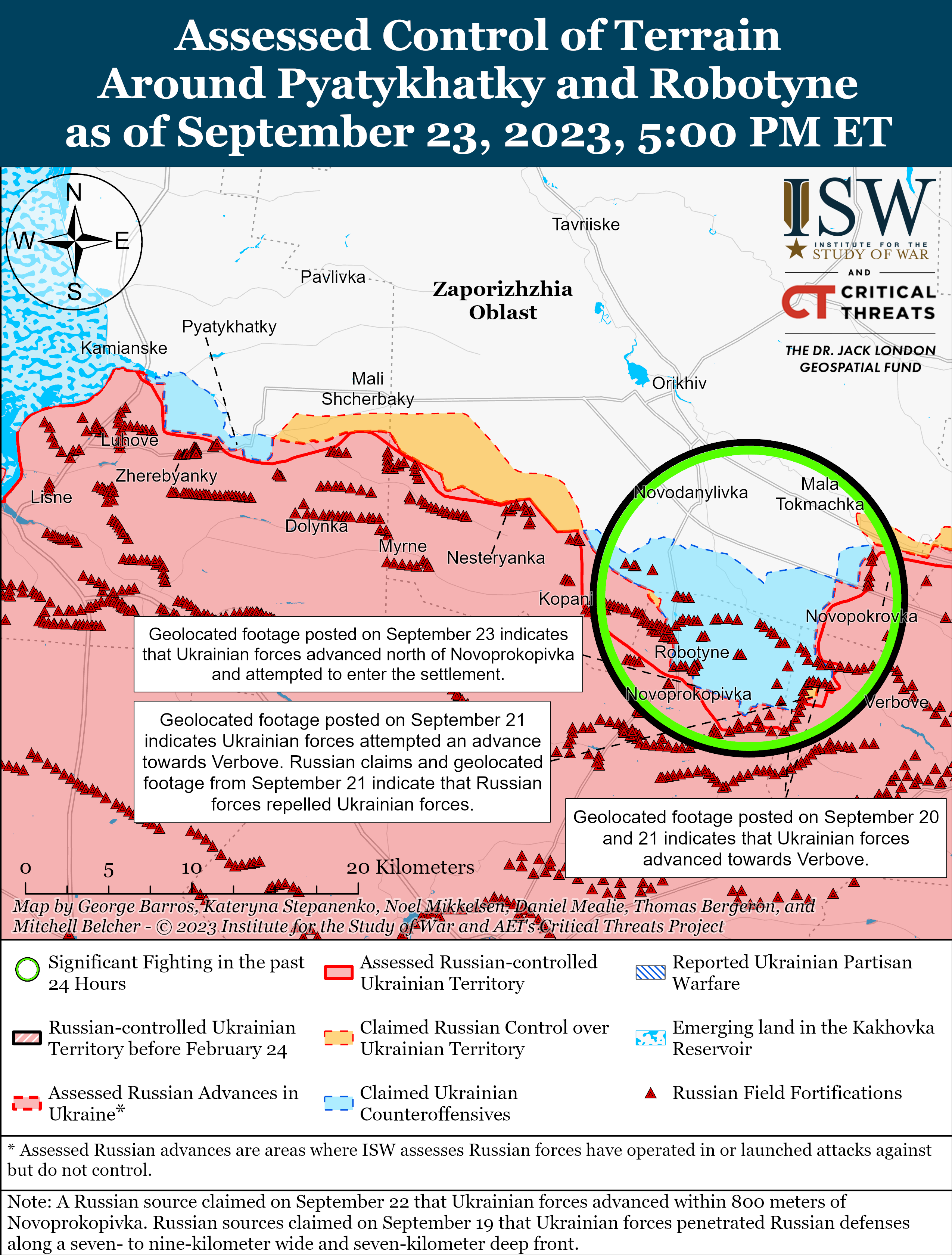
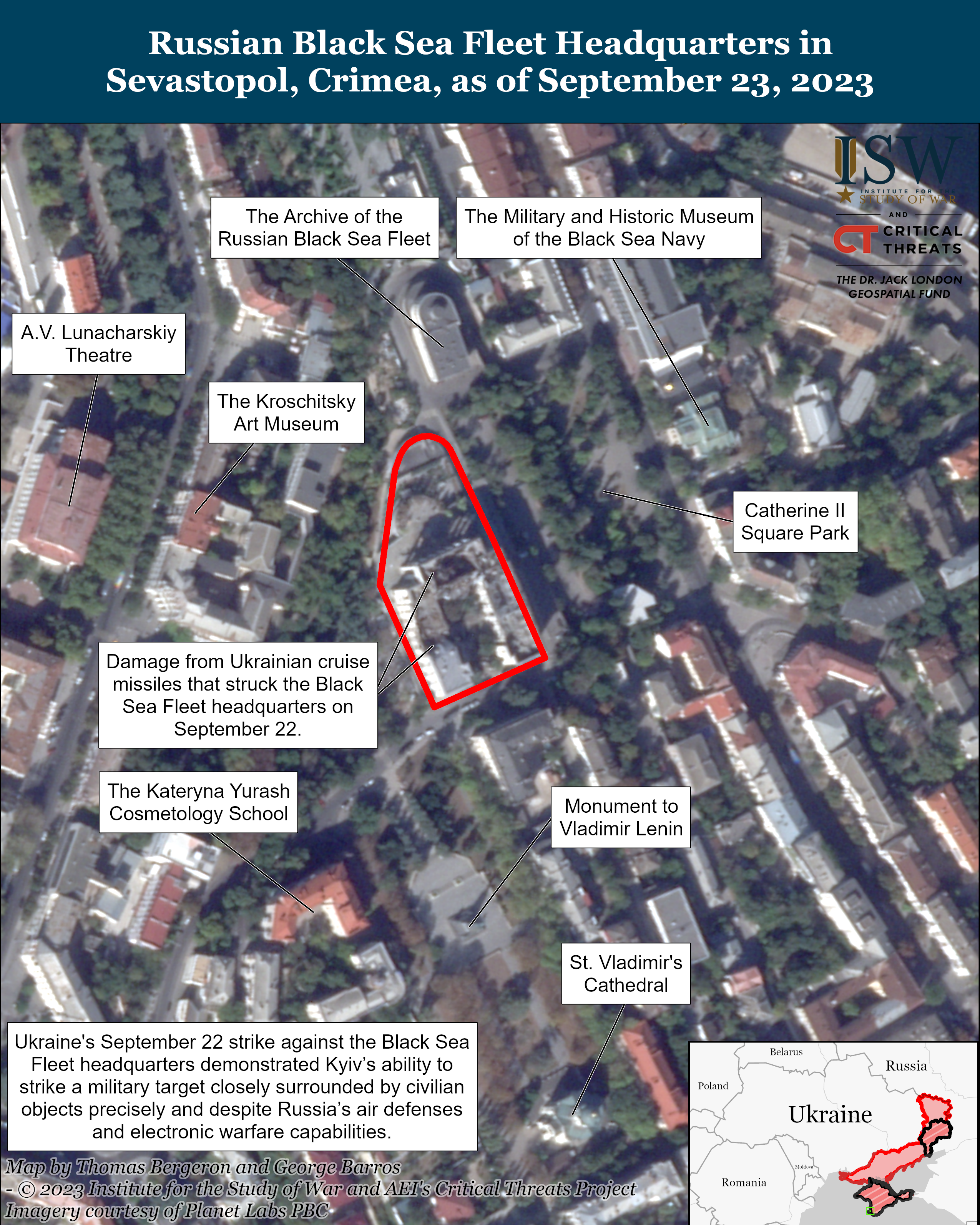
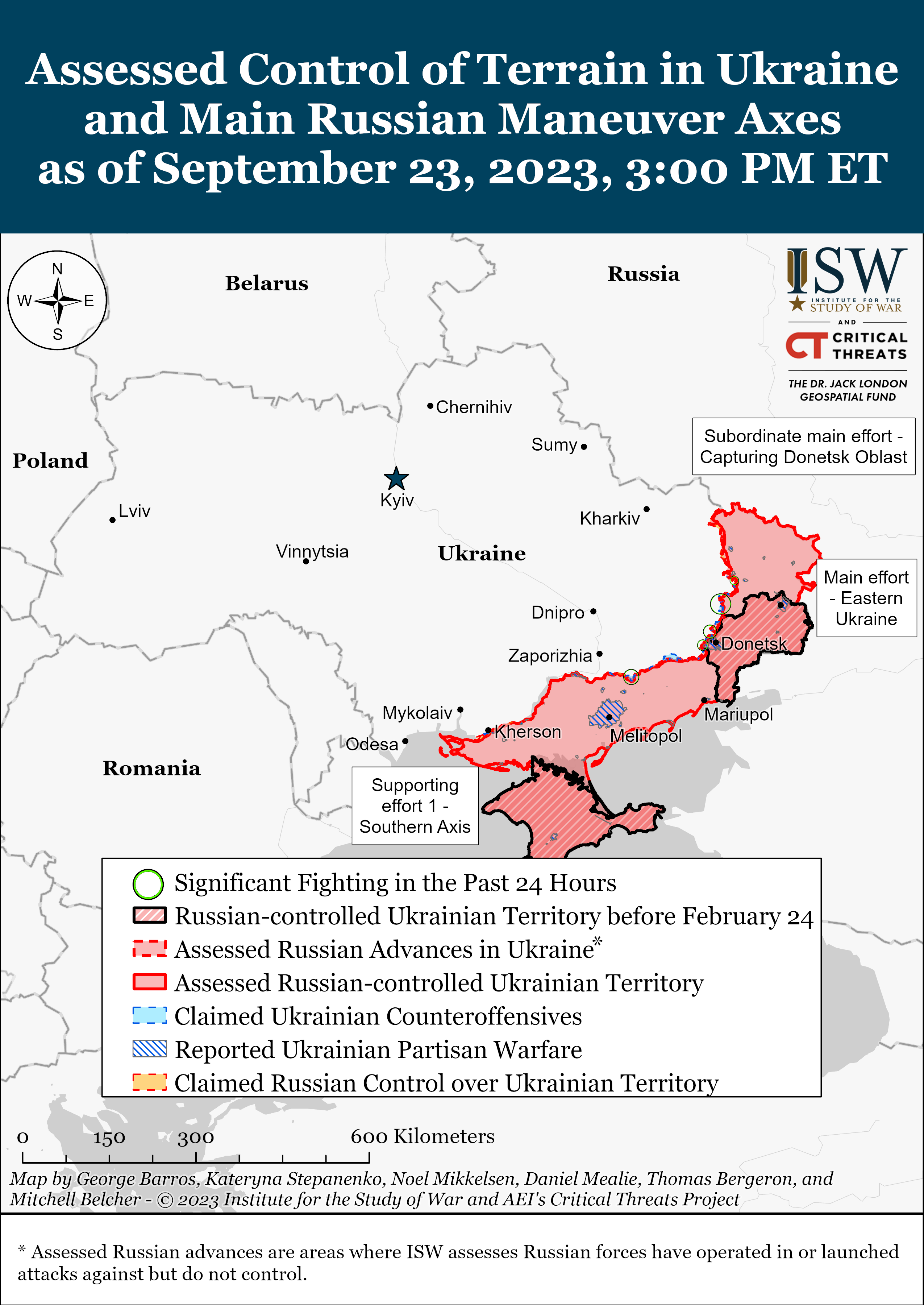
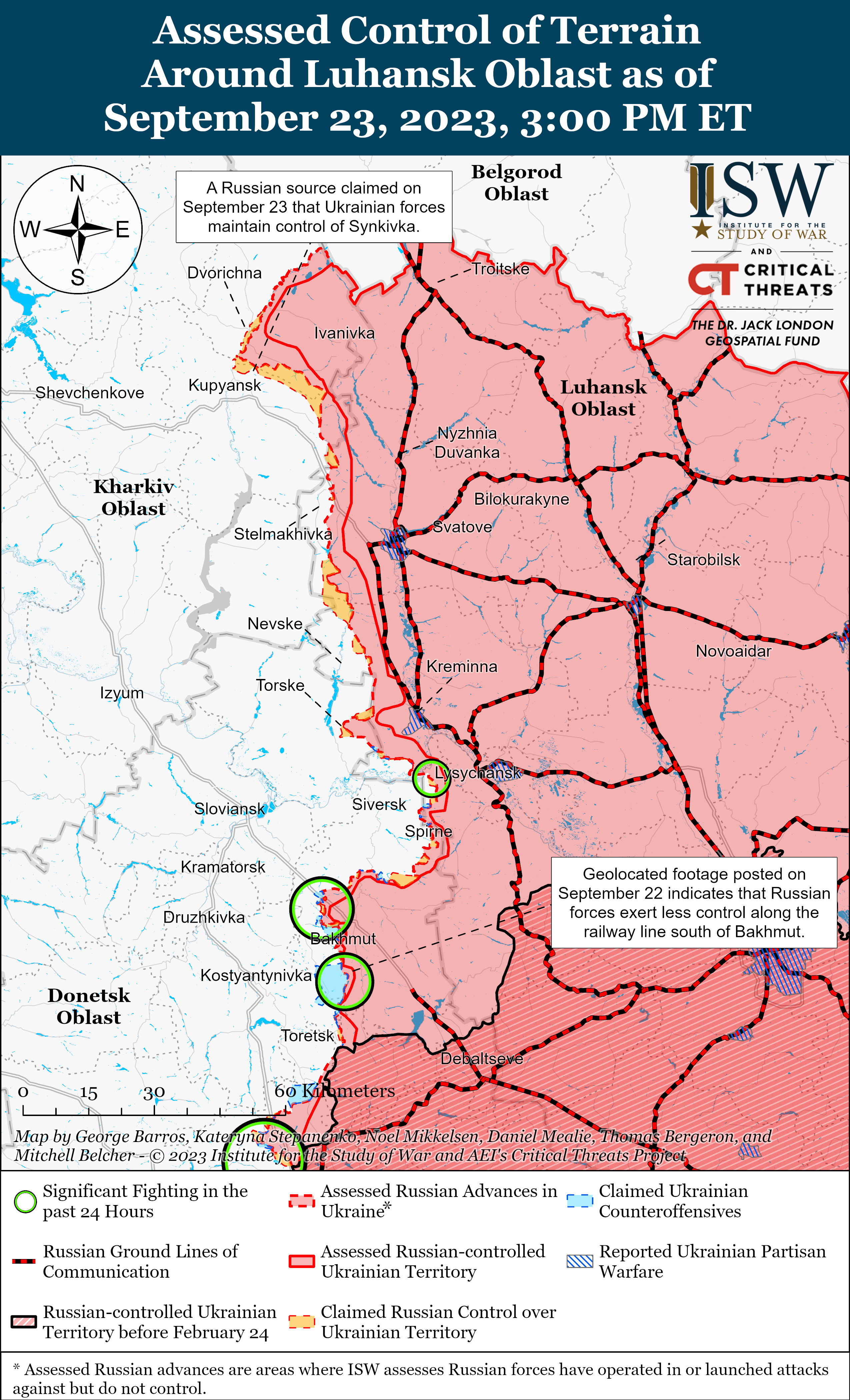
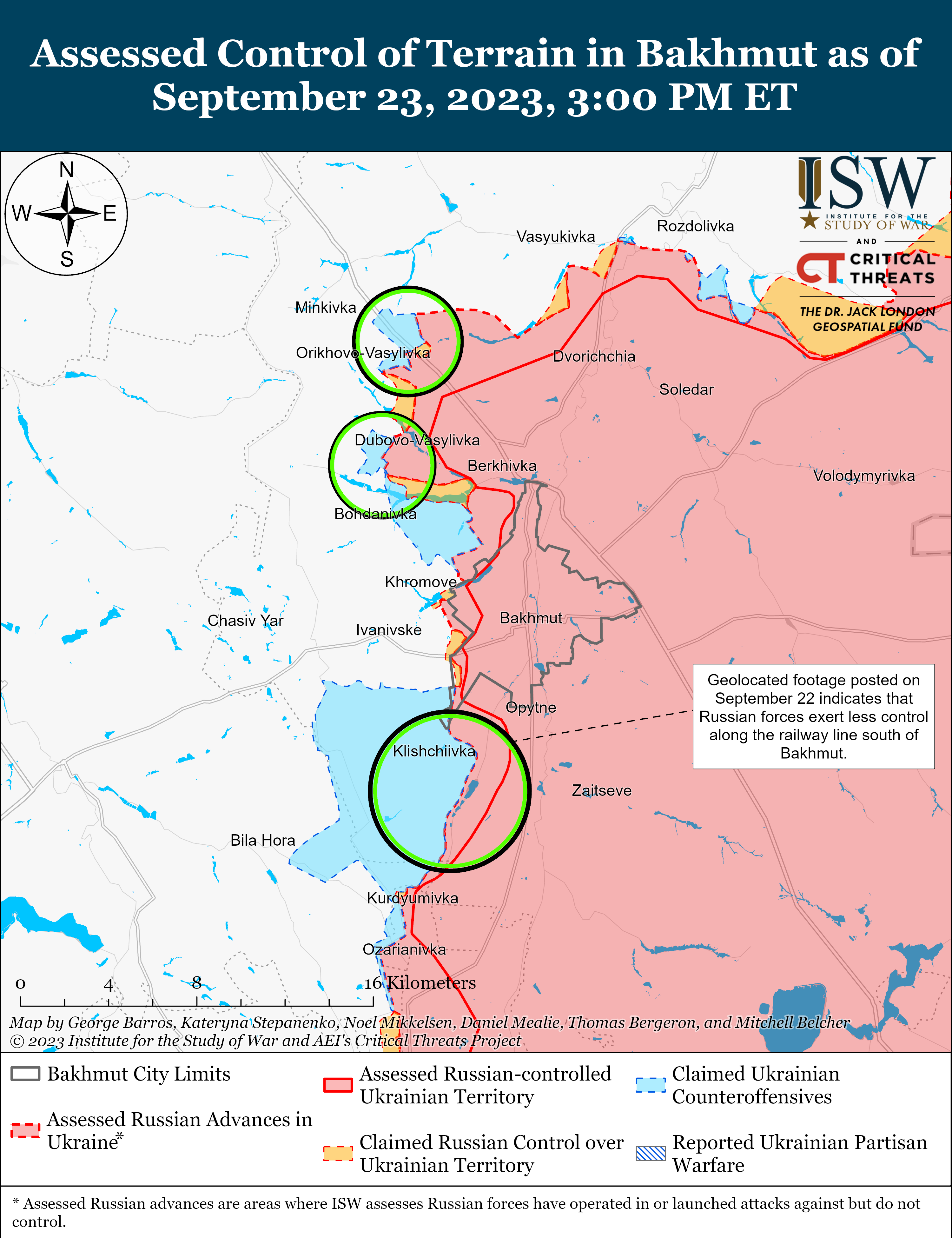
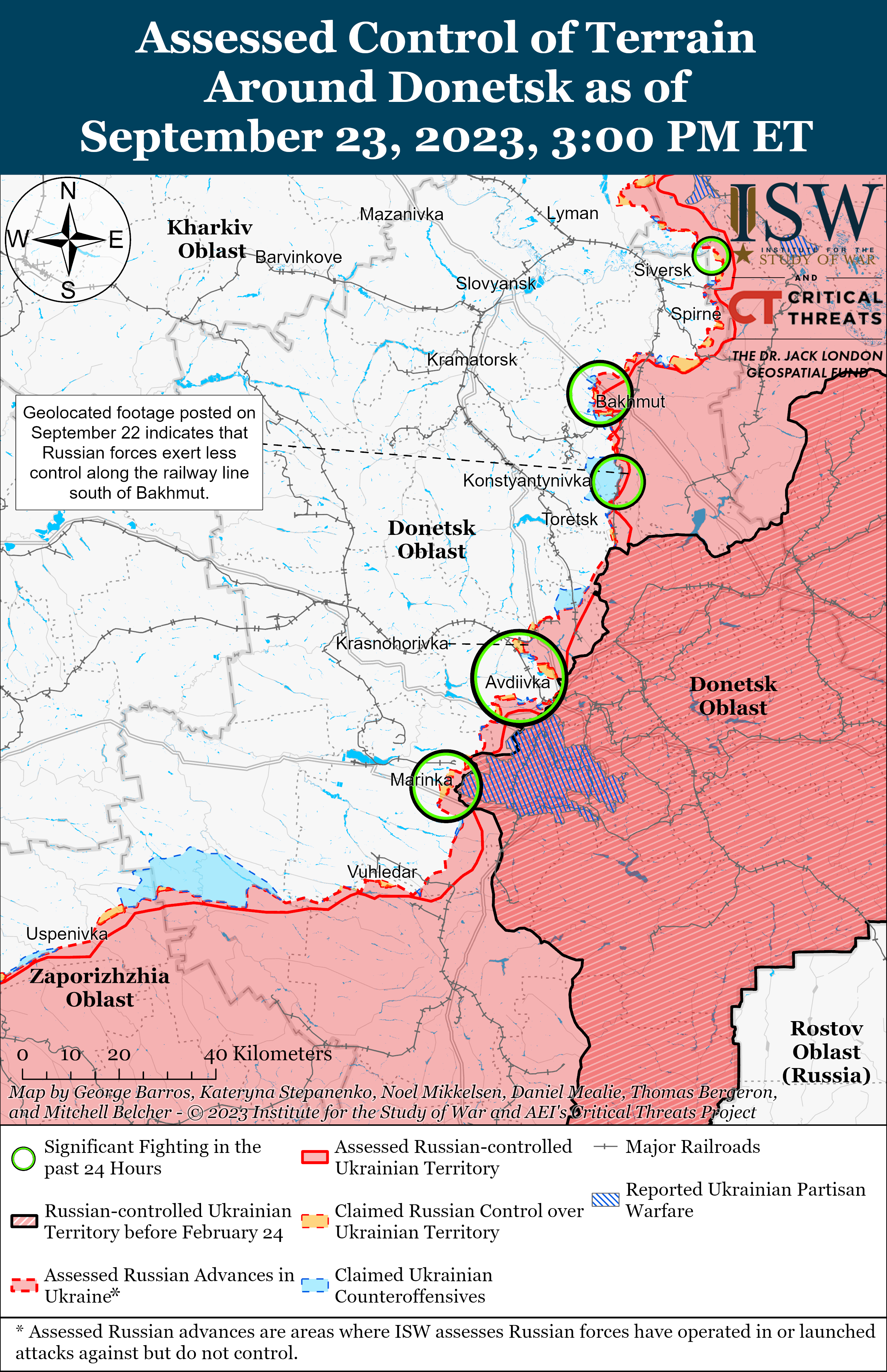
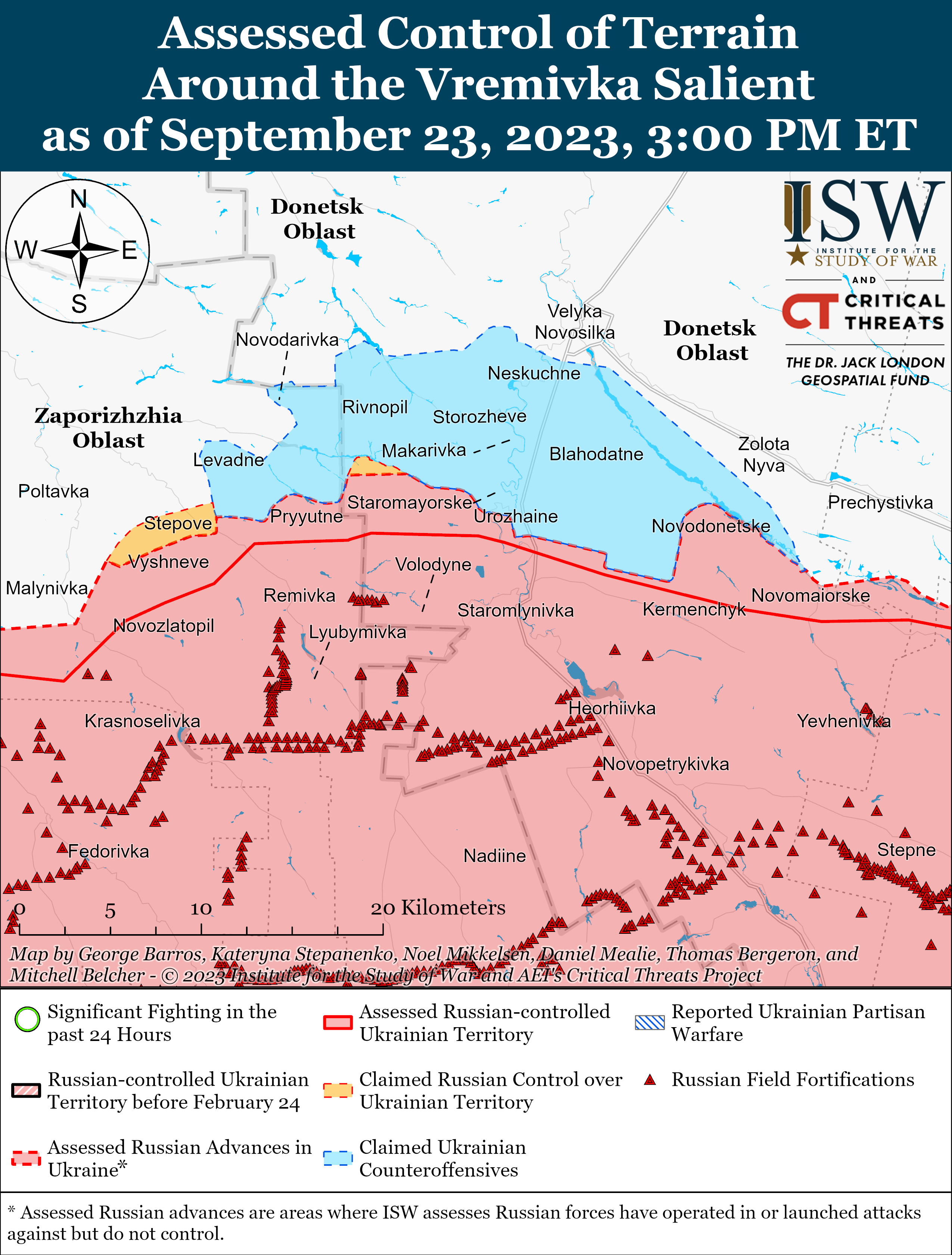
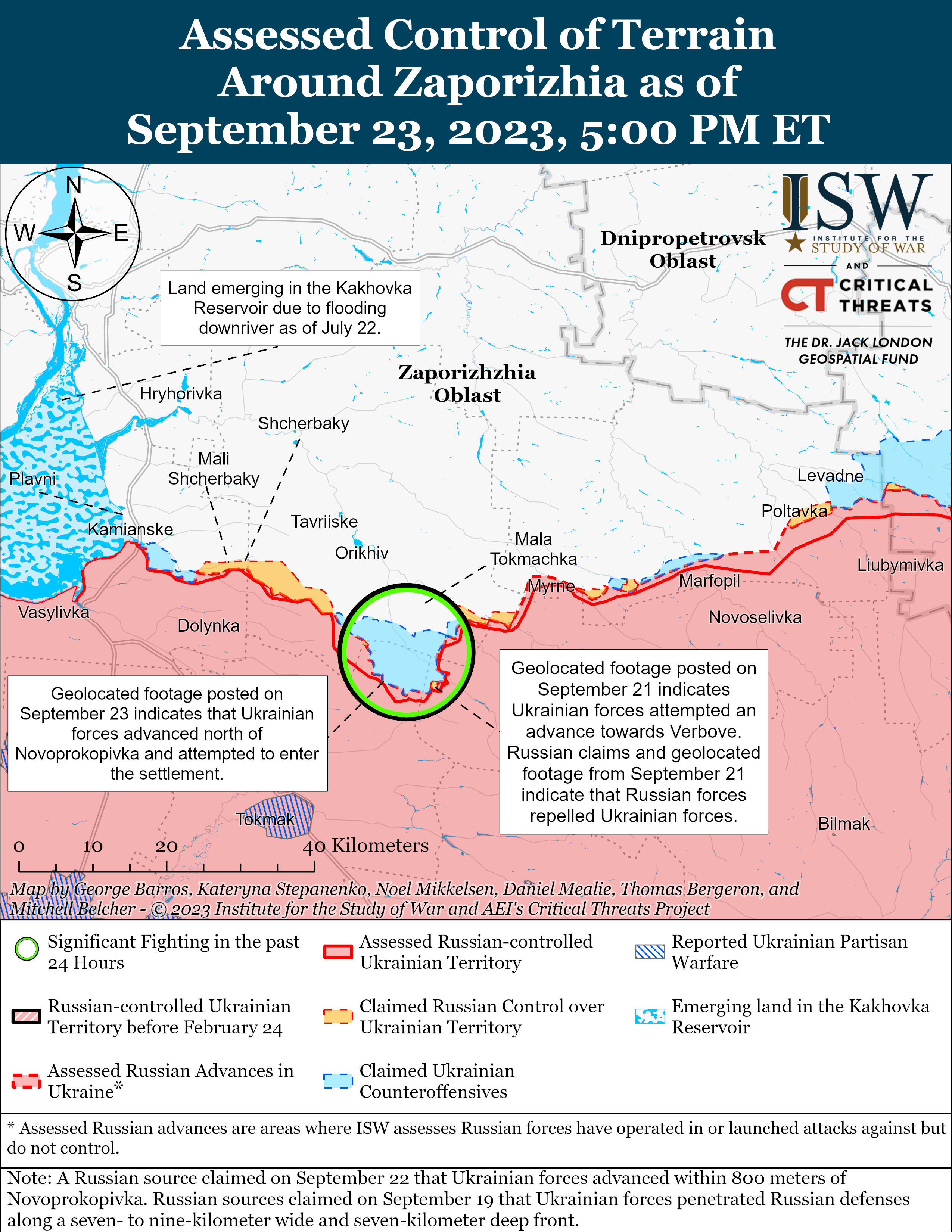
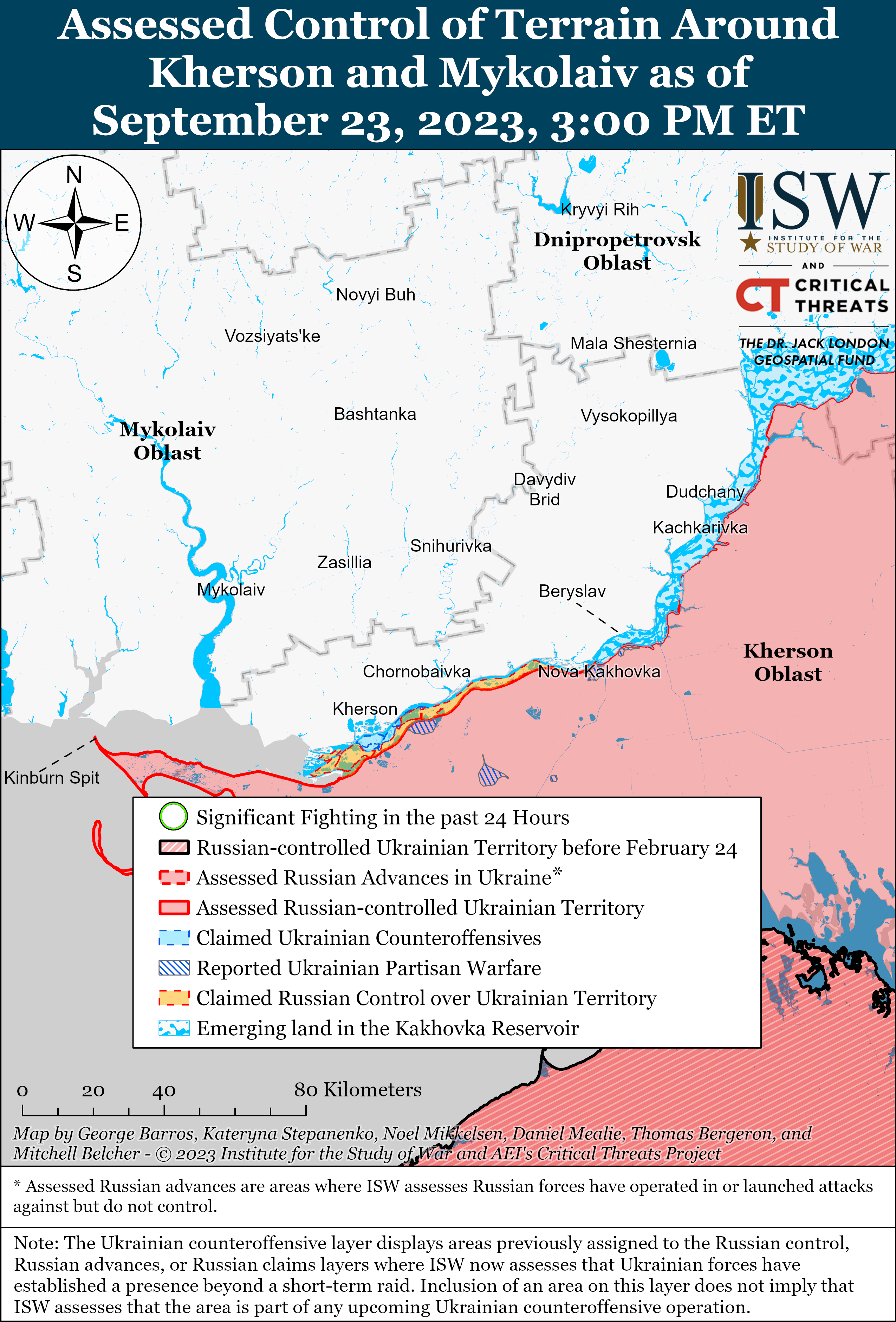
No comments:
Post a Comment